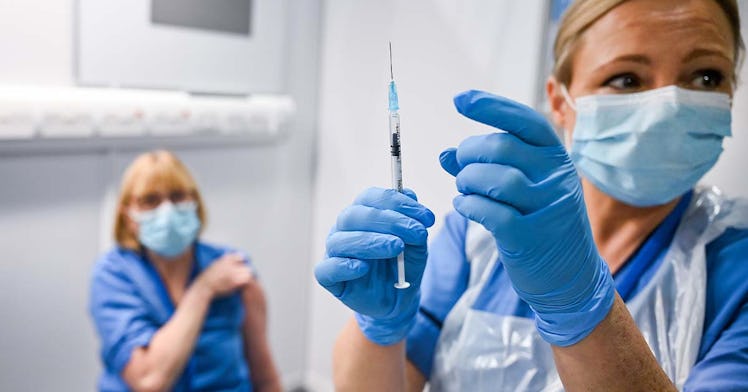Women Have Worse COVID-19 Vaccine Reactions Than Men — Here’s Why
The female immune system is stronger. That’s both good and bad for women.

With new guidelines from the CDC that give fully vaccinated people much more freedom to socialize, many people are coveting the day they can get their COVID-19 vaccine. Those who are fortunate enough to have received it already are thankful — even though many of them have had side effects ranging from pain at the injection site to severe flu-like symptoms. Luckily, side effects are far from guaranteed. But according to recent research, women are far more likely to experience them than men.
In the first month of COVID-19 vaccination in the US, women received about 61 percent of the doses but accounted for 79 percent of symptoms, according to a CDC report. Over approximately the same time period, 66 people had a severe allergic reaction called anaphylaxis after getting inoculated with the Pfizer or Moderna vaccines. Only three of them were men.
This disparity between men and women isn’t surprising to medical experts. “This sex difference is completely consistent with past reports of other vaccines,” Sabra Klein, an immunologist at the Johns Hopkins Bloomberg School of Public Health, told the New York Times. For example, men received the majority of 2009 pandemic flu vaccines, but four times as many women reported allergic reactions.
Sex hormones are a major explanation for why vaccine side effects hit women harder. Cisgender women have more estrogen and less testosterone than cis men. Both bind to the surface of immune cells. Estrogen can trigger the production of more antibodies, and is one reason why women generally produce more antibodies in response to vaccines — sometimes up to twice as many, according to the Times. Testosterone, however, “is kind of beautifully immunosuppressive,” Klein said. It decreases production of cytokine, an immune chemical, and men with more testosterone are less protected by the flu vaccine compared to men with less testosterone.
Genetics also probably plays a role. Women generally have two X chromosomes and men only one, and X marks the spot for many immune-related genes. Women may also need lower vaccine doses than men — and lower doses could mean less side effects — but trials don’t test different doses for different sexes.
The good news is that for both men and women, side effects are generally short-lived and mild. Pain at the injection site is the most common symptom, and it occurs in about 71 percent of people post-vaccination. The next most common side effect, fatigue, only shows up in about 34 percent of people, according to the CDC report. Headache, muscle ache, chills, fever, and injection site swelling are less common. Only about 10 percent of people report joint pain and 9 percent report nausea. Side effects seem to be more common after the second dose.
Although they may be unpleasant, side effects a sign that your immune system is reacting correctly to the vaccine. Your body is preparing its defenses against the coronavirus so you can fight it off if you’re exposed. “You will likely be protected as a result,” Klein said.